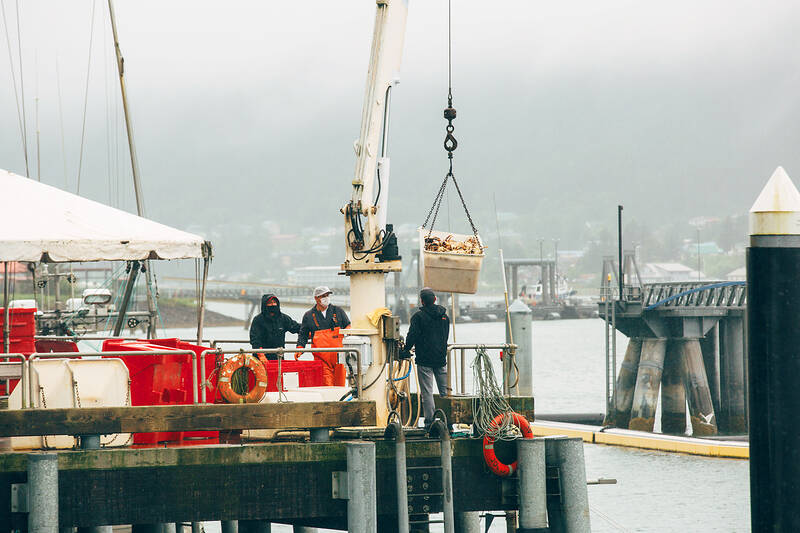Alaskan officials have canceled the upcoming snow crab season, due to population decline across the Bering Sea.
The fall Bristol Bay red king crab harvest would not happen, while the winter harvest of smaller snow crab has also been canceled for the first time.
The causes of the population collapse are being researched but likely include increased predation and stresses from warmer water, which the US Environmental Protection Agency said might have prompted the crabs to shift away from coasts.

Photo: Bloomberg
“In the Bering Sea, Alaska pollock, snow crab and Pacific halibut have generally shifted away from the coast since the early 1980s... They have also moved northward by an average of 19 miles,” the federal agency said.
The Alaska closures reflect conservation concerns about both crab species following bleak summer population surveys. The decisions to shut down the harvests came after days of discussions among Alaska state biologists and senior officials, who faced crabbers’ pleas for at least small takes to be allowed.
“These are truly unprecedented and troubling times for Alaska’s iconic crab fisheries and for the hard-working fishermen and communities that depend on them,” said Jamie Goen, executive director of Alaska Bering Sea Crabbers, a trade association.
“Second and third-generation crab-fishing families will go out of business due to the lack of meaningful protections by decisionmakers to help crab stocks recover,” she added.
The Alaska Department of Fish and Game (ADF&G) released a statement saying that “management of Bering Sea snow crab must now focus on conservation and rebuilding given the conditions of the stock.”
Bering Sea snow crab populations declined after a 2019 warming that scrambled the broader marine ecosystem. Last year’s snow crab harvest of 2.54 million kilograms was the smallest in more than 40 years.
Within the limits of a federal management plan, Alaska determines how many crab are caught each year.
A scientific model of the snow crab population reviewed by the federal North Pacific Fishery Management Council last week indicated there might have been enough this year for a small harvest.
However, Ben Daly, an ADF&G research coordinator, said the model has struggled to account for the dramatic population decline after the 2019 warming, and state officials were concerned it might not be accurate.
“We have extreme conservation concerns about the population. We have serious doubts about the model,” Daly told the Associated Press.

The death of a former head of China’s one-child policy has been met not by tributes, but by castigation of the abandoned policy on social media this week. State media praised Peng Peiyun (彭珮雲), former head of China’s National Family Planning Commission from 1988 to 1998, as “an outstanding leader” in her work related to women and children. The reaction on Chinese social media to Peng’s death in Beijing on Sunday, just shy of her 96th birthday, was less positive. “Those children who were lost, naked, are waiting for you over there” in the afterlife, one person posted on China’s Sina Weibo platform. China’s

‘NO COUNTRY BUMPKIN’: The judge rejected arguments that former prime minister Najib Razak was an unwitting victim, saying Najib took steps to protect his position Imprisoned former Malaysian prime minister Najib Razak was yesterday convicted, following a corruption trial tied to multibillion-dollar looting of the 1Malaysia Development Berhad (1MDB) state investment fund. The nation’s high court found Najib, 72, guilty on four counts of abuse of power and 21 charges of money laundering related to more than US$700 million channeled into his personal bank accounts from the 1MDB fund. Najib denied any wrongdoing, and maintained the funds were a political donation from Saudi Arabia and that he had been misled by rogue financiers led by businessman Low Taek Jho. Low, thought to be the scandal’s mastermind, remains

Australian Prime Minister Anthony Albanese yesterday announced plans for a national bravery award to recognize civilians and first responders who confronted “the worst of evil” during an anti-Semitic terror attack that left 15 dead and has cast a heavy shadow over the nation’s holiday season. Albanese said he plans to establish a special honors system for those who placed themselves in harm’s way to help during the attack on a beachside Hanukkah celebration, like Ahmed al-Ahmed, a Syrian-Australian Muslim who disarmed one of the assailants before being wounded himself. Sajid Akram, who was killed by police during the Dec. 14 attack, and

VISHNU VANDALS: A Cambodian official accused Thailand of destroying a statue in a disputed border area, with video showing the Hindu structure being torn down The Thai military said ceasefire talks with Cambodia, set to begin yesterday, are expected to conclude with a meeting of the countries’ defense ministers on Saturday, as the two sides seek to end weeks of deadly clashes. The talks started at 4pm in Thailand’s Chanthaburi Province, which borders Cambodia. The Thai Ministry of Defense outlined several demands to be discussed ahead of the bilateral meeting of the General Border Committee (GBC) on Saturday. If secretariat-level discussions fail to reach agreement on key technical frameworks such as troop deployments, the Thai side would not proceed with the GBC meeting or sign any agreement on